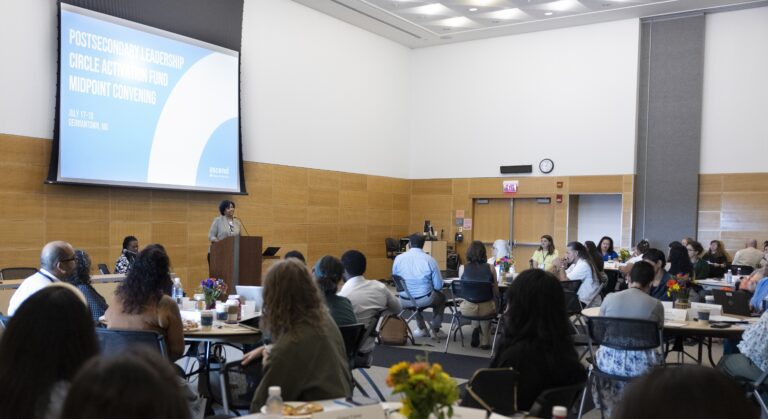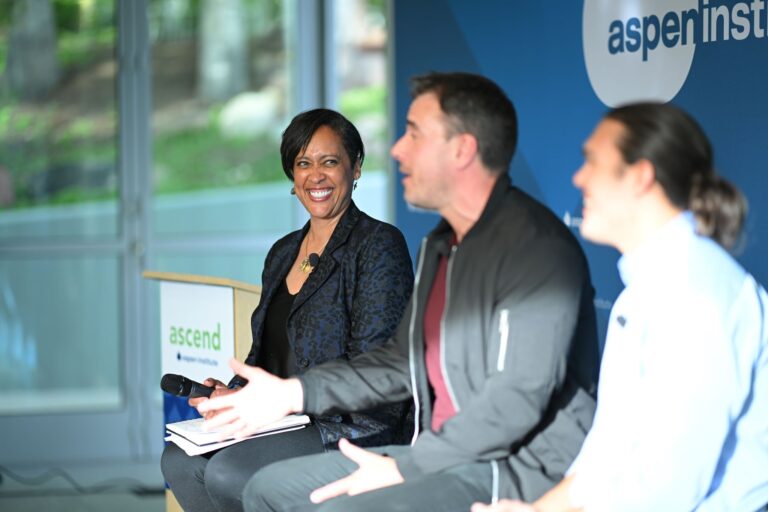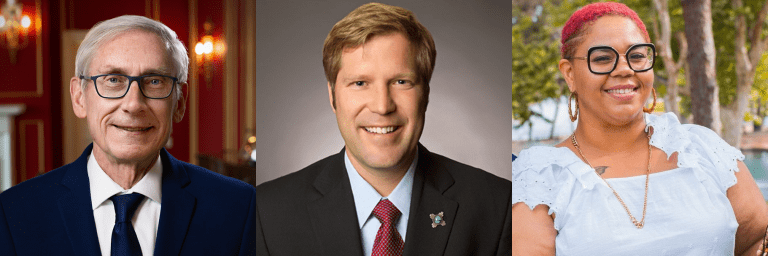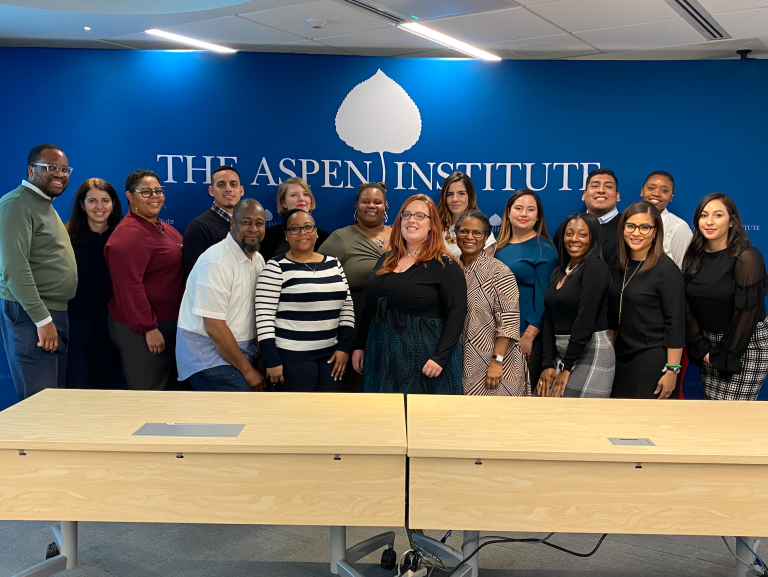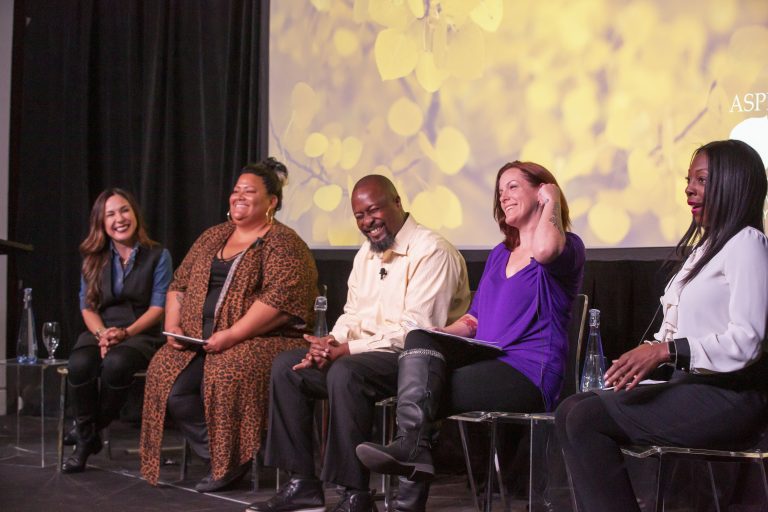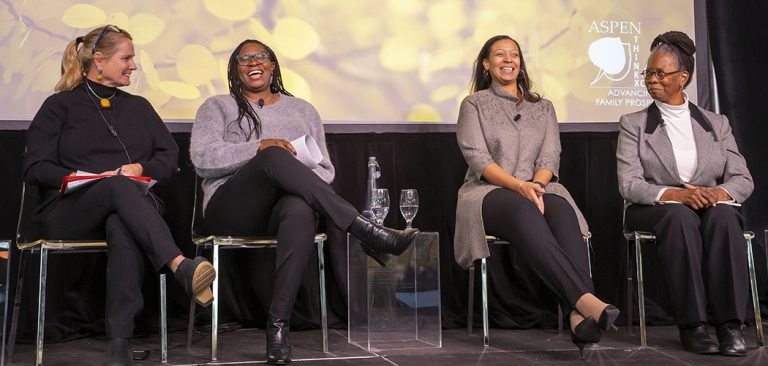The Women Wave: Fueling a Revolution of Respect and Dignity for All
Photo caption, from left to right: Ingrid Saunders Jones, National Chair, The National Council of Negro Women, Inc.; Cathy Trost, Executive Director and Senior Vice President, Freedom Forum Institute; Lorraine Hariton, President and CEO, Catalyst; Anne Mosle, Vice President, Aspen Institute, and Executive Director, Ascend at the Aspen Institute
In the fall of 2017, the courageous stand by women to step up and say #metoo and Time’s Up fueled a new national conversation on sexual harassment that accelerated in 2018. Women – especially those survivors of sexual violence – strongly and thoughtfully raised their voices on behalf of dignity, equality, and fairness. They called attention to a power dynamic that has shaped women’s lives in schools, relationships, the workplace, and society. It’s a power imbalance that has for far too long undermined the ability of girls and women to achieve their full potential.
In 2018, women’s collective boldness, courage, and action resulted in the firing and resignation of powerful men as well as the passage of new laws. It reignited an awareness, and subsequent changes, in every sector of society – not just in the United States, but around the world. Even as the year draws to a close, changes continue. In early December, Congress approved a bill to overhaul sexual harassment reporting in Congress and to end taxpayer-funded secret settlements to victims of sexual harassment. Also in December, new revelations about CBS and the activities of former CEO, Les Moonves, continued to emerge, and the company is immersed in a “reckoning” about its culture and its lack of respect for women’s safety and equity.
This post #metoo era has ignited women’s activism in electoral politics as well, leading a “women’s wave” where women voters and candidates from diverse backgrounds and equipped with compelling visions changed the composition and began chipping away at the culture of Congress, state houses and governorships. The 2018 mid-term elections created renewed energy and fresh, immediate actions from diverse, newly elected leaders signaling that the effort to call attention to overdue action and accountability in the media and the private sector will continue to grow.
Despite these advances and the resulting optimism, there is more work to do, especially in a political climate where ideology is shaping the debate and creating a backlash against progress. Recent research shows that it is still risky for employees to report sexual harassment on the job. We need more leaders, especially in the workplace, to stand up and say sexual harassment is not acceptable and will not be tolerated. It matters. When the people at the top say they take sexual harassment seriously, it improves the working climate for all. From the cleaning of hotel rooms and conduct in the newsroom to the safety on college campuses and walking down the street safely – it’s time for us to fully embrace and be accountable to a new era of respect, dignity, and opportunity for all.
Leaders from business, government, advocacy, and news organizations shared their powerful voices and lessons learned with us at the Aspen Institute’s Forum on Women and Girls Roundtable Sustaining the Movement: Changing the Culture this past October.
Together we discussed promising practices that have emerged to stop sexual harassment and assault in our society. Radical collaboration is needed to build on the momentum that developed in 2018. We discussed a path forward with the critical elements of depolarizing and depoliticizing the issue, so that focus remains on the behavior of sexual harassment, including sexual coercion and unwanted sexual attention. Further, it is important to keep support for survivors at the center and continue to uplift survivors as leaders. Listening and strategizing across generations to explore and develop a restorative justice model that has a clear definition and understanding, while emphasizing accountability, is needed. And, creating institutional change (in companies, the media, government) at every step and rank to sustain and build on #MeToo’s momentum with an emphasis on intersectionality and understanding of systemic issues, is the goal.
All indications are that 2019 will continue the arc of change. Keep these on your radar.
In the media, The Freedom Forum Institute, through its Power Shift Project, an industry-wide response to concerns about sexual misconduct in media organizations and a catalyst for change to create safer, more equal and diverse newsrooms will convene Power Shift Summit 2.0. This January 15 convening will discuss what has changed in around the issue of sexual misconduct in media organizations.
In corporations, Catalyst will continue its leadership in bringing men to the table through its program Men Advocating Real Change (MARC) that encourages men to leverage their privilege and speak up when they see bad behavior.
In the sciences, The National Academies of Sciences, Engineering, and Medicine, building off its groundbreaking June 2018 report on sexual harassment of women in the sciences, will organize a group of pioneering academic institutions and foundations to form an action collaborative that will work toward targeted, collective action for addressing and preventing all forms of sexual harassment and promoting a culture of civility and respect. The American Association for the Advancement of Science (AAAS) STEM Equity Achievement (SEA Change) program—a self-assessment, metrics, and certification program that promotes removing the structural barriers for women, blacks, Latinx, Native Americans and all people who are marginalized—will continue to grow. Based on the Athena SWAN program in the United Kingdom, SEA Change will shift how women, among others, are recruited, retained, and advanced in science, technology, engineering, medicine, and mathematics.
TIME’S UP will celebrate its first anniversary in January 2018 and is building on its initial commitments to promote safety, equity, and dignity at work, while also being inclusive and intersectional. In 2019 it will detail its efforts to change corporate practices, laws, and policies, with attention to women who are at the biggest disadvantage at work.
As we make sure this moment becomes unstoppable, it’s important to remember that the other side of sexual harassment is a culture of dignity, respect, and opportunity, and it’s within our grasp. We are just getting started in our efforts to shift the power dynamic in our culture. We continue to have conversations that can help propel women and girls forward and must continue to act.
There are many challenges and setbacks to consider, and we must articulate a positive vision for the future that includes everyone and calls them to act. Cultural change and institutional transformation are possible if we are deliberate and persistent. We must be committed to pushing forward and bending the arc toward justice.
Check out the Aspen Insight podcast episode, The Impact of the Women’s Wave, with Anne Mosle and Peggy Clark, Vice President at the Aspen Institute and Executive Director of Aspen Global Innovators.
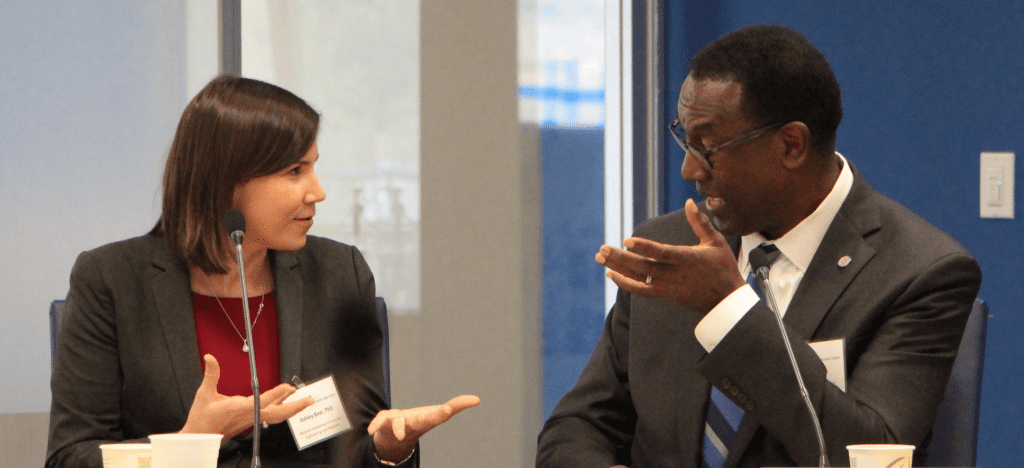
Related Posts
